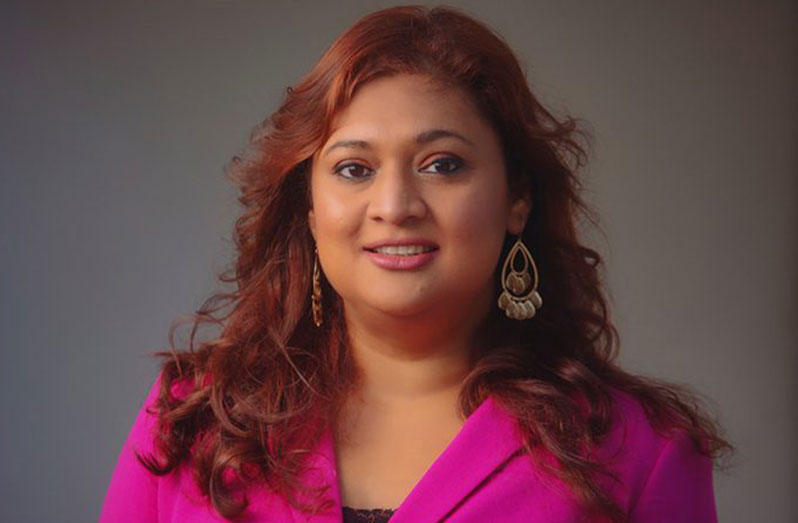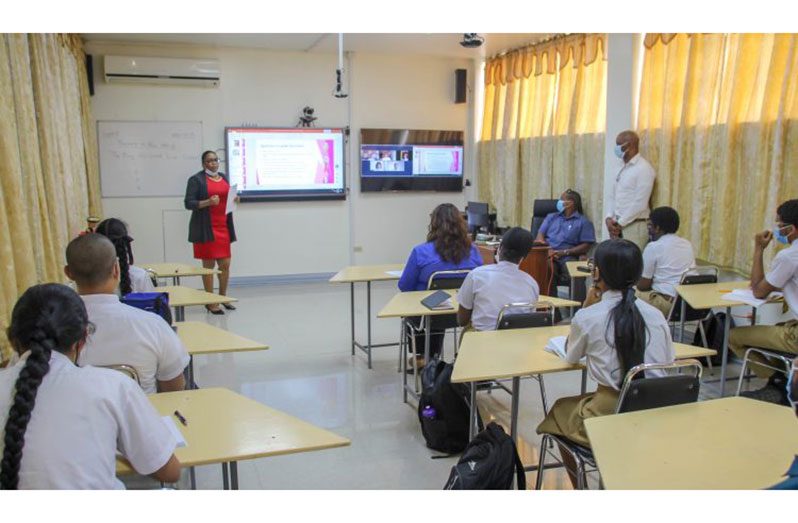— innovative approaches to delivering education adopted, says Education Minister
IN Guyana, like across the world, the COVID-19 pandemic has had a devastating effect on the education sector. School closures magnified deficiencies and disparities in the system, and the disadvantages of not integrating technology into education delivery were laid bare.
According to UNICEF reports, by April 2020, approximately 91 per cent of learners across the world were affected by school closures. Navigating uncharted territory, a conversation on the learning loss and its effects has been ongoing.
“We’ve been shocked into the position of having to close our school doors. This has never happened before, and we are yet to see the effects of that,” Minister of Education, Priya Manickchand, highlighted in a recent interview with the Guyana Chronicle.
Minister Manickchand took up her ministerial portfolio in August 2020, following the conclusion of the 2020 elections here in Guyana. By then Guyana was already five months into its growing COVID-19 situation, making her job even harder as she faced the pressure of crafting a way forward.
Notwithstanding the health crisis it effected, the COVID-19 situation has also pushed the education system to fast track several developments that have long since been needed, but saw delays in being implemented.

“Guyana understands that this is going to have long-term effects. We’re going to do a lot and work very hard and put strategies in place to try to stem this from becoming something. We’re trying to do some of that now,” she told the Guyana Chronicle.
Today, teachers all across the country are delivering virtual classes to learners using electronic devices, a multi-million dollar programme to expand the Learning Channel is ongoing, complemented by a programme to create locally-produced content to air, and smart classrooms are being expediently rolled out to offer teaching to hinterland learners by proficient teachers on the coast.
The infrastructure of all schools across the country is also being assessed and rehabilitated to provide better sanitary facilities. Additionally, thousands of structured worksheets have been printed and distributed to temporarily supplement the lack of teaching, particularly in hinterland regions, where Internet connectivity is less available.
“COVID-19 presented us with opportunities to shake up the system a little bit. Opportunities to both teach and learn in different ways effectively,” minister noted.
PLANNING NECESSARY
It is uncertain, however, just how big an impact the implementation of the new technological measures will have, particularly given the learning loss that the ministry will have to address once schools reopen and return to normalcy.
“Because we’ve had to do this in a rush without planning it properly and preparing activities to determine its effectiveness, we were not able to roll out the kind of distance education that we could have, but what we saw were the great opportunities that distance education can provide,” the Education Minister said.
One year after COVID-19, Guyana has come a far way in battling the virus, but it took the country some months to get here.
When the first case of COVID-19 hit Guyana on March 11, 2020, the nation was caught unprepared.
Confining but necessary measures immediately began to be rolled out to curtail the spread of the virus and health and safety became the main focus. Almost abruptly, learning institutions, both public and private, were ordered to be closed.
Following soon after was the postponing of critical national examinations such as the National Grade Six Assessment (NGSA) which was originally scheduled for April 8 – 9, 2020, the Caribbean Secondary Education Certificate (CSEC) Examination and the Caribbean Advanced Proficiency Examination (CAPE) customarily held in May/June.
The situation took a psychological toll on many learners who were gripped with the uncertainty of their academic future. The greatest concern was for hinterland learners, who were already at a disadvantage in education delivery when compared to their coastland counterparts.
By May, some relief came. The Caribbean Examinations Council (CXC) made the decision for the sitting of the CSEC examination and CAPE in July. The Ministry of Education (MoE) similarly decided to forge ahead with the sitting of the NGSA in July as well. Schools were temporarily reopened in June for the Grade Six and Grade 11 learners to have access to classes.
FINANCIAL CONCERNS
In addition to concerns of its effects on academics, the school closure also brought some financial unease for parents.
For the public schools, the Government was able to maintain payment of teachers, through the public coffers. At private schools, the business owners grappled with the challenge of figuring out how to continue to deliver their service while contending with parents calling for reduced fees, and teachers hoping to see their salaries maintained.
Most of the private schools turned to technology to remain viable. Some of the schools began re-engaging learners virtually, as early as one month after the closure.
At the public school level, some amount of limited unofficial learning began as public school teachers also began to voluntarily utilise technological means to connect with learners via the Internet.
In September, the ministry did an official virtual reopening of schools. Money was budgeted for the rolling out of a multi-faceted blended approach that included several media including television, radio, Internet and the printed worksheets.
“It has been extremely difficult. Partly because all we know in Guyana is face-to-face learning. We have no technology incorporated in any major way. E-learning or any form of distance learning was non-existent prior to this, which is unfortunate, but we have managed to do a few things that we should be proud of in terms of the effort to get there,” Manickchand commented.




.png)









